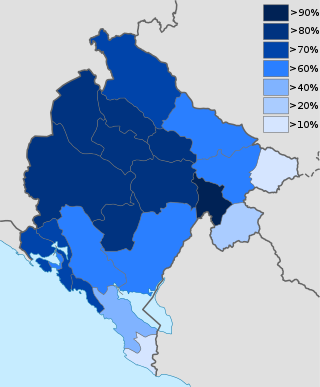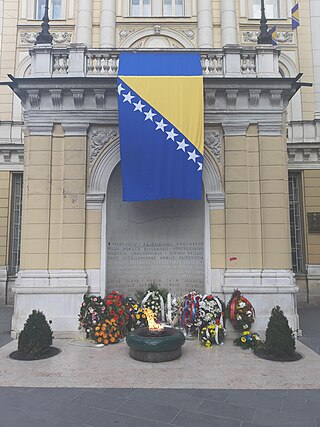
The President of Serbia and Montenegro was the head of state of Serbia and Montenegro. From its establishment in 1992 until 2003, when the country was reconstituted as a confederacy via constitutional reform, the head of state was known as the President of the Federal Republic of Yugoslavia. With the constitutional reforms of 2003 and the merging of the offices of head of government and head of state, the full title of the president was President of Serbia and Montenegro and Chairman of the Council of Ministers of Serbia and Montenegro. In 2006 the office was abolished as the state union was dissolved, with Serbia and Montenegro becoming independent countries and was followed by Kosovo in 2008 although it received limited international recognition.

The Hungarian Workers' Party is a communist party in Hungary led by Gyula Thürmer. Established after the fall of the communist Hungarian People's Republic, the party has yet to win a seat in the Hungarian parliament. Until May 2009, it was a member of the Party of the European Left. It was formed from, and considers itself the successor to, the former ruling Hungarian Socialist Workers' Party.

Parliamentary elections were held in Austria on 1 March 1970. The result was a victory for the Socialist Party, which won 81 of the 165 seats to become the largest party for the first time in the Second Republic. With the SPÖ two seats short of a majority, SPÖ leader Bruno Kreisky became Chancellor at the head of a minority government that was tolerated by the Freedom Party of Austria in return for electoral reforms that benefitted smaller parties by increasing the proportionality of votes and seats. Voter turnout was 91.8%. It was the first Socialist-led government since 1920, and the first purely left-wing government in Austrian history. The SPÖ would lead the government for the next 29 years.
The Patriotic Coalition for Yugoslavia was a political alliance in Montenegro which ran in 2002 parliamentary election. The coalition members were:
Presidential elections were held in Montenegro on 11 May 2003. They were the third such elections in six months, as those held in December 2002 and February 2003 had been declared invalid due to voter turnouts of less than 50%. For the May election, the turnout rule was abolished. The result was a victory for Filip Vujanović, who was nominated by the Democratic Party of Socialists of Montenegro and Social Democratic Party of Montenegro, who received 64.2% of the vote. Vujanović had also won both previous votes by a large margin. The elections were boycotted by the opposition Together for Change coalition.

Parliamentary elections were held in Montenegro on 20 October 2002. The result was a victory for the For a European Montenegro alliance formed by the Democratic Party of Socialists (DPS) and the Social Democratic Party (SDP), which won 39 of the 75 seats. It was the last parliamentary election held in Montenegro prior to independence referendum in 2006.

The 1992 Montenegrin independence referendum was the first referendum regarding Montenegrin independence, held on 1 March 1992 in SR Montenegro, a constituent republic of the Socialist Federal Republic of Yugoslavia.
Constitutional Assembly elections were held in the newly-independent Republic of Montenegro on 10 September 2006. Prime Minister Milo Đukanović's Coalition for a European Montenegro won a majority in Parliament, winning 41 of the 81 seats. The opposition blocs together won 34 seats; 12 for the Serb List (SL) and 11 each for the Socialist People's Party (SNP)-led list and the Movement for Changes (PzP). Other seats were won by parties representing national minorities. As the opposition conceded defeat, DPS leader Đukanović stated "These elections showed that Montenegro is stable and firm on its European path."

General elections were held in the Federal Republic of Yugoslavia on 24 September 2000. They included the presidential election, which was held using the two-round system, with a second round scheduled for 8 October. After the first round, the Federal Electoral Commission announced that Vojislav Koštunica of the Democratic Opposition of Serbia (DOS) was just short of the majority of all votes cast needed to avoid a runoff against the runner-up and incumbent president Slobodan Milošević. However, the DOS coalition claimed that Koštunica had received 52.54% of the vote. This led to open conflict between the opposition and government. The opposition organised demonstrations in Belgrade on 5 October 2000, after which Milošević resigned on 7 October and conceded the presidency to Koštunica. USAID subsequently released revised election results with Koštunica having slightly over 50% of all votes cast.

The Republic of Serbia was a constituent state of the Federal Republic of Yugoslavia between 1992 and 2003 and the State Union of Serbia and Montenegro from 2003 to 2006. With Montenegro's secession from the union with Serbia in June 2006, both became sovereign states in their own right for the first time in nearly 88 years.

Montenegrin–Serbian relations are foreign relations between Montenegro and Serbia. From 1918 until 2006, the two states were united under the Kingdom of Yugoslavia, the Socialist Federal Republic of Yugoslavia, and Serbia and Montenegro. There is controversy regarding the national identity of Montenegro due to recent political developments in the region. There is a debate on the ethnic identification of Montenegrins, and the name of the national language. Despite this, the two countries have maintained mostly friendly relations.

Parliamentary elections were held in Federal Republic of Yugoslavia on 31 May 1992. The elections were boycotted by almost all opposition parties in protest at both how the electoral law had been passed, and the unequal access to finance and the media given to the governing and opposition parties. Independent Milan Panić became federal Prime Minister. Following mass protests, Panić and federal President Dobrica Ćosić agreed to hold new elections in December under a new electoral system.

Early parliamentary elections were held in the Federal Republic of Yugoslavia between 20 December 1992 and 3 January 1993, following changes to the constitution in September 1992. The Socialist Party of Serbia emerged as the largest party in Parliament, winning 47 of the 138 seats.

Parliamentary elections were held in Austria on 9 November 1930. The Social Democratic Workers' Party emerged as the largest faction in the National Council, with 72 of the 165 seats, but the Christian Social Party formed a new coalition government with Otto Ender as Chancellor. Voter turnout was 90%.
General elections were held in Bosnia and Herzegovina on 18 November 1990, with a second round of voting in the House of Peoples elections on 2 December. These were the final general elections to be held in Bosnia and Herzegovina while it was still a constituent republic of the SFR Yugoslavia.

Parliamentary elections were held in Czechoslovakia on 26 and 27 November 1971. They were the first held after the Constitutional Act on the Czechoslovak Federation converted Czechoslovakia into a federal republic, comprising the Czech Socialist Republic and the Slovak Socialist Republic, as well as the first elections in Czechoslovakia held in the aftermath of the Prague Spring.
Parliamentary elections were held in Romania on 2 March 1969. The Front of Socialist Unity (FUS), which had been formed a year earlier to replace the People's Democratic Front (FDP), was the only organization that contested the election; no prospective candidate could run for office without the Front's prior approval. Like the People's Democratic Front, the Front of Socialist Unity was dominated by the Romanian Communist Party (PCR). The Front won all 465 seats in the Great National Assembly.

Independence Day is a public holiday observed in Federation of Bosnia and Herzegovina held on 1 March to celebrate the independence of the then Republic of Bosnia and Herzegovina from the Socialist Federal Republic of Yugoslavia in 1992. It is not observed in Republika Srpska, the other political entity of Bosnia and Herzegovina.
The Liberal-Social Union was a political alliance in Czechoslovakia and the Czech Republic, existing from 1991 to 1994, and led by František Trnka.











